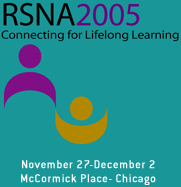
Abstract Archives of the RSNA, 2005
Ryuji Okazaki MD, PhD, Presenter: Nothing to Disclose
Yuseok Moon PhD, Abstract Co-Author: Nothing to Disclose
Toshiyuki Norimura PhD, Abstract Co-Author: Nothing to Disclose
Thomas Eling PhD, Abstract Co-Author: Nothing to Disclose
To clarify the effects of ionizing irradiation on the expression of non-steroidal anti-inflammatory drugs activated gene (NAG-1) and p53 in colon cancer cell, we analyzed the frequencies of apoptosis of human colon cancer cell line after γ-ray irradiation, and then evaluated the relationship with the expressions of NAG-1 and p53.
HCT116 (p53+/+), HCT15 (p53 mutant) and p53 knock out HCT116 (p53-/-) were irradiated with 3Gy γ-rays, and then harvested up to 48 h after irradiation. Apoptotic cell was measured by Annexin-V assay. NAG-1 and p53 expressions were evaluated by RT-PCR and Western blot assay. NAG-1 promotor was evaluated by luciferase assay.
In HCT116 p53+/+ cells, the apoptosis was increased both time-dependently and dose-dependently. However, in HT15 p53 mutant cells and HCT115p53-/- cells, there were no remarkable changes in apoptosis. The expression of p53 protein in HCT116 cells was increased after irradiation that was followed by an increase in the expressions of NAG-1 protein. In contrast, the expression of NAG-1 protein in p53 mutant cells and p53-/- cells was not increased by the radiation treatment, suggesting that p53-mediated NAG-1 induction was required for apoptosis. The controlled expression of NAG-1 increased apoptosis in HCT116 cells but radiation did not further increase apoptosis. The transfection of an NAG-1 siRNA into HCT116 suppressed irradiation induced apoptosis and inhibited the induction of NAG-1 protein without altering the expression of p53. The luciferase reporter of NAG-1 luciferase promoter with the two p53 binding site was enhanced by irradiation in dose dependent manner, but the promoters lacking of either or both p53 binding site in the NAG-1 promoter activity were less responsive or did not respond.
The findings reported here indicate that γ-irradiation activates the p53 tumor suppressor and its inducible gene NAG-1, which mediates the induction of apoptosis.
Okazaki, R,
Moon, Y,
Norimura, T,
Eling, T,
Ionizing Radiation Enhances the Expression of Non-Steroidal Anti-Inflammatory Drug-activated Gene (NAG-1) by Increasing the Expression of p53 in Human Colon Cancer. Radiological Society of North America 2005 Scientific Assembly and Annual Meeting, November 27 - December 2, 2005 ,Chicago IL.
http://archive.rsna.org/2005/4405262.html

